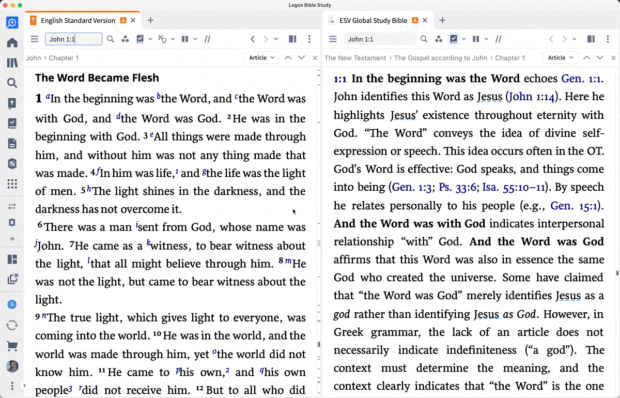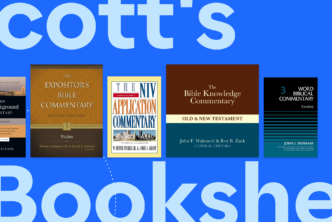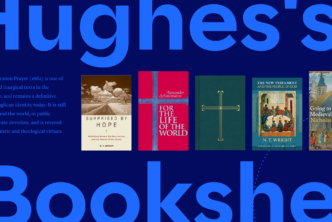A few years ago during the COVID shutdowns, my ministry, which I call “Disciple Dojo,” had to pivot from a weekly lunchtime Bible study at a local restaurant to teaching via YouTube. As anyone with a YouTube channel can attest, the algorithm can be a cruel master, and one must regularly put out content if they expect their channel to ever be seen by more than one’s mother.
As I was considering how to move from in-person Bible teacher to online Bible nerd, it occurred to me that in my former role as discipleship pastor at a large church, a regular part of my job had been helping connect church members and small group leaders with good Bible study resources. I had recommended books and study Bibles over the years to so many people looking for solid study material.
As I glanced across the room at my shelf full of study Bibles, I thought, “Why don’t I just record a few quick videos letting people know what is actually in all these Bibles to help them make a more informed decision when shopping for a study Bible?” So I grabbed my smartphone and a stack of my most used Bibles, set up the ring light, and pressed record. Initially, these videos were just intended as bonus material for the channel. But they quickly became my most popular videos—by far.
And I understand why! In our modern evangelical consumerist culture, one could easily drown in the sea of Bibles churned out each year by publishers hoping to resonate with various demographics. And naturally, as with any other product in a consumer culture, people often turn to YouTube for product reviews before forking over their hard-earned cash. Bible shoppers are no exception.
The goal of Disciple Dojo study Bible reviews is to blow through the marketing chaff in order to help people find the kernels of solid Bible study material out there in the (over)crowded Bible publishing marketplace. With that in mind, I’d like to share a few things that I think people should be on the lookout for when considering which study Bible they should buy.
Bible version or study Bible?
First of all, it’s important to recognize that many people—even pastors and church leaders—don’t actually understand the difference between a Bible version (or translation) and a study Bible. This may seem self-explanatory, but I can assure you after over two decades of teaching the Bible in local church settings around the world and online, it most certainly is not.
So for those who may not know the difference, here’s a quick overview.
Bible versions or translations
A Bible version is created when scholars take the texts of the Scripture in the original Hebrew, Aramaic, and Greek languages in which they were written and translate them into whatever language their audience speaks.
The KJV, ASV, NIV, CSB, ESV, NLT, NET, CEB—all these are Bible versions (or translations). Bible versions will often have occasional footnotes which alert the reader to specific words, phrases, text-critical decisions, or alternative renderings they feel the reader should be aware of. These are translation notes, and there are typically very few of them (the NET Bible being the uber-exception!).
A study Bible, on the other hand, is the result of a publisher taking a Bible version and adding all manner of notes, charts, maps, illustrations, quotes, or special formatting features around the biblical text to help readers better understand the meaning or application of the text. At its best, a good study Bible is like reading the Bible with numerous theologians, archaeologists, text-critical scholars, and historians standing over your shoulder pointing out things that you may not have otherwise known.
A Bible version is the actual food and drink in a nourishing meal; a study Bible is all the plates, bowls, cups, utensils, napkins, and suggestions from the sommelier that help us better enjoy that meal.
Finding a good study Bible
Now that we have that basic distinction clear, here are a few things I personally look for when recommending a good study Bible.
1. Substance over style
The difference between a study Bible and a devotional, preaching, or reading Bible is in that first little word—STUDY. The primary purpose of a good study Bible is to provide the reader with information that the reader does not know, and which helps bring out the meaning of the text in some way. How this information gets presented is, of course, where issues of style and aesthetics come into play. But a beautifully designed study Bible that doesn’t actually do much to help the reader better understand the text is, proverbially speaking, like a gold ring in a pig’s snout (Prov 11:22)! With that in mind, here are a few criteria that distinguish a good study Bible from a not-so-good study Bible.
A good study Bible will:
i. Have articles and essays that help orient the reader to the world of Scripture—literarily, historically, and theologically.
A few examples:
- Cultural Backgrounds Study Bible
- Life Application Study Bible
- Archaeological Study Bible
ii. Have book introductions and outlines that help the reader get a big-picture understanding of a given book (such as Genesis or Matthew) and will provide a roadmap through its contents so readers don’t get lost along the way.
A few examples:
- Biblical Theology Study Bible
- ESV Study Bible
- CSB Study Bible
- Filament Bibles
iii. Have maps, diagrams, and illustrations that bring the historical reality of the text to life for the reader in vivid and accessible format.
A few examples:
- Faithlife Study Bible
- Cultural Backgrounds Study Bible
- NLT Illustrated Study Bible
iv. Have notes throughout the text that explain problematic passages or obscure concepts that the reader may not be familiar with already.
A few examples:
- Faithlife Study Bible
- NET Bible Full Notes Edition
- Life Application Study Bible
- Cultural Backgrounds Study Bible
v. Have indexes, concordances, or other tools with which the reader can easily find a verse, passage, or topic they are looking for.
A few examples:
- NIV Study Bible
- CSB Study Bible
- NASB Study Bible
vi. Have ample room on the page for the reader to make their own notations and the paper will be sturdy enough to write on or highlight.
A few examples:
vii. Present the text of Scripture clearly in an easy-to-read format, making clear what is Scripture and what is study material.
A few examples:
Not every study Bible will have all of these features—and some of the ones that have come closest are sadly out of print! But these are helpful basic criteria to look for when considering any study Bible on the market. Again: look for substance over style.
2. Collaboration over celebrity
Look, too, for what I might call “collaboration over celebrity.”
It is not uncommon to see study Bibles marketed under the name of famous preachers, teachers, or authors. This started back in the early 1900s with Scofield, continued with Dake, Ryrie, and others, and continues today with celebrity preachers I need not name. There is nothing necessarily wrong with being famous, and the quality of an individual study note in such a Bible may be high.
Of course, it also may not. But the problem with celebrity-named study Bibles is not only that you’re getting just one person’s views and theology; it’s that no single teacher, no matter how gifted, has enough expertise with the texts, languages, history, archaeology, and theology of every single book of the Old and New Testaments to give solid, full, well-thought-out, well-researched study material on the whole of God’s Word.
Instead of notes by a celebrity preacher or popular author, Bible students are better served by collaborative work among numerous scholars and contributors—all of whom have dedicated their scholarly focus to whichever subject they are being asked to provide study helps on.
In other words, a good study Bible will have book introductions and study notes on Revelation by someone who has dedicated years of their career to studying and teaching apocalyptic writings. Summaries of the united or divided monarchies will be written by scholars who have spent years of their lives sifting through the historical books of the Hebrew Bible and who have a working familiarity with the landscape and archaeology of the Levant. Theological essays will be authored by someone who has a broad and deep knowledge of the history of interpretation of the text throughout various traditions. Text-critical issues will be presented by someone who has spent years looking at manuscripts through a magnifying glass with a working knowledge of ancient orthography. Application or devotional notes will be compiled by those with years of experience in the fields of ethics, pastoral leadership, or counseling.
In short, a good study Bible is a collaborative effort among a wide range of genuine experts in their fields.
3. Ecumenism over theological particularism
In addition to being collaborative, a good study Bible should be fair in acknowledging the fullness of Christ’s body. While denominational resources and theological training in the particulars of one’s tradition are helpful and even necessary, the Bible does not belong solely to any denomination or theological tradition. It is the Scripture of God’s people across the ecclesial spectrum; a good study Bible should help readers see and wrestle with this as much as possible.
Of course it may be helpful to know how a passage or book has been interpreted by a particular tradition—whether Wesleyan, Calvinist, Lutheran, Catholic, or Orthodox—but Jesus’s body is bigger than just one tradition, so a good study Bible should pull from a wide range of scholars, historians, and thinkers in order to give readers a better understanding of the spectrum of faithful interpretive options, even if it ends up leaning more to one in particular.
A good study Bible will come to a passage where Christians have differed throughout history and say, “Here’s how some Christians have interpreted this passage; here’s how other Christians have interpreted this passage.” It may advocate for one interpretation being more plausible than others—that is perfectly fine. But a good study Bible won’t be dogmatic about an interpretive issue over which faithful Christians have historically differed, and it won’t overlook or strawman those views with which the author disagrees.
Instead, a good study Bible will present the reader with the options and will fairly summarize them. This not only exposes readers to a wider range within Christ’s Body, but it also helps the reader reason from Scripture rather than being force-fed a particular theology. The reader is thereby encouraged to dig into the text (as well as other available resources) himself or herself, while also being informed on how Christians throughout the ages have approached interpretive disagreements.
Conclusion
There is no such thing as “the perfect study Bible,” and different readers in different contexts will have different needs. But after reviewing dozens and dozens of study Bibles on the market over the past few years, the above criteria are what I encourage DiscipleDojo viewers to consider when choosing one.
That’s especially true if that study Bible is going to serve as their primary Bible study resource. My hope is that more publishers will take note of these principles, and that we will subsequently see a shift away from trendy aesthetic and marketing hype to more robust content that helps readers make sense of the text of God’s Word and better understand its life-changing message.
Study Bibles mentioned in this article
Why use study Bibles like these in Logos?
Study Bibles are especially great in Logos, because the notes can be taken “off the page” of the Bible and put in their own window. You can even link the windows so that as you scroll through the Scripture text, the notes advance with it. Take a look:

Related articles
- Why In-Depth Bible Study Doesn’t Have to Be Hard
- Here’s Your Secret Weapon to Reach Bible Study Goals





